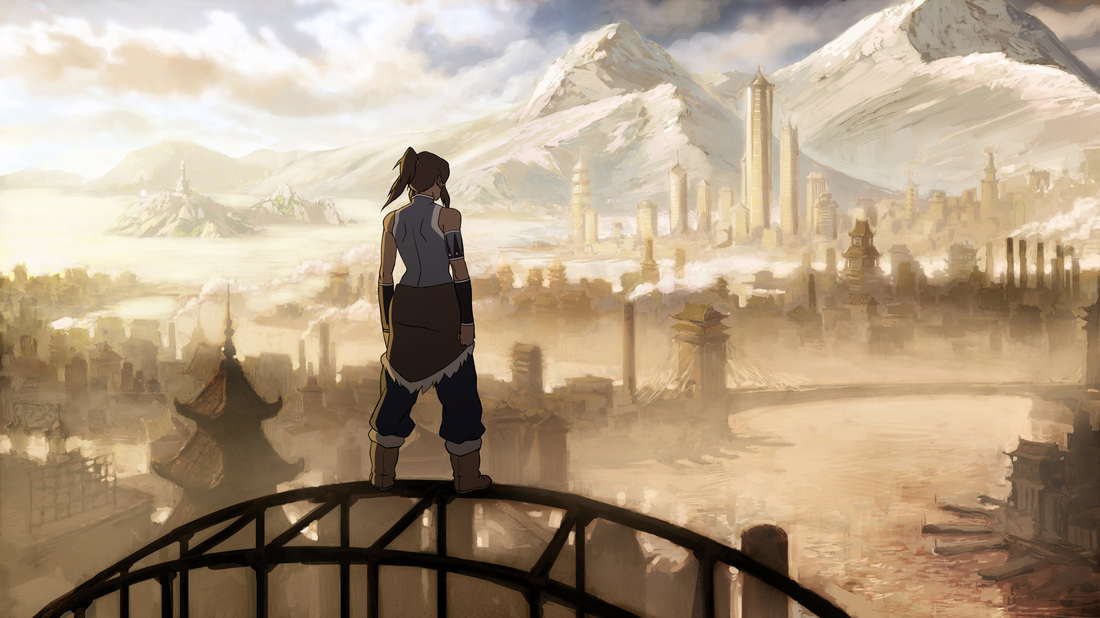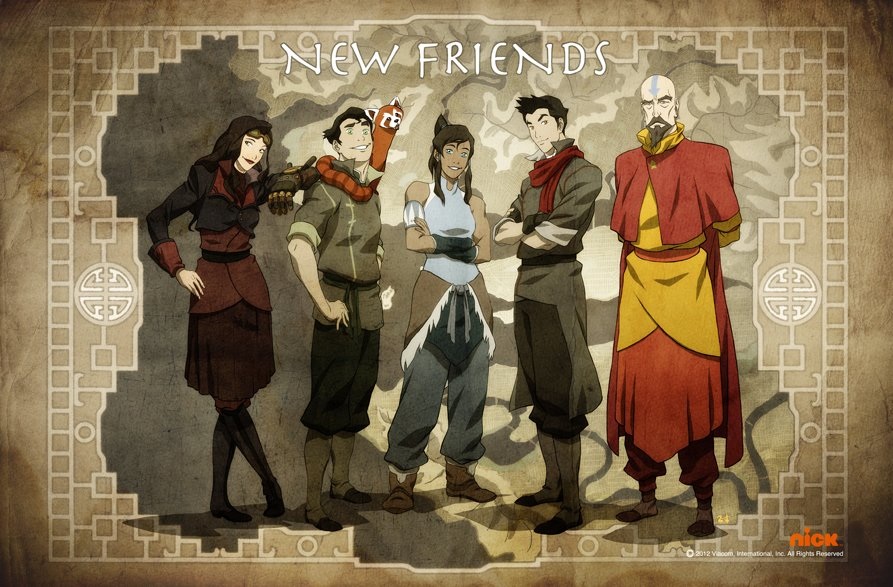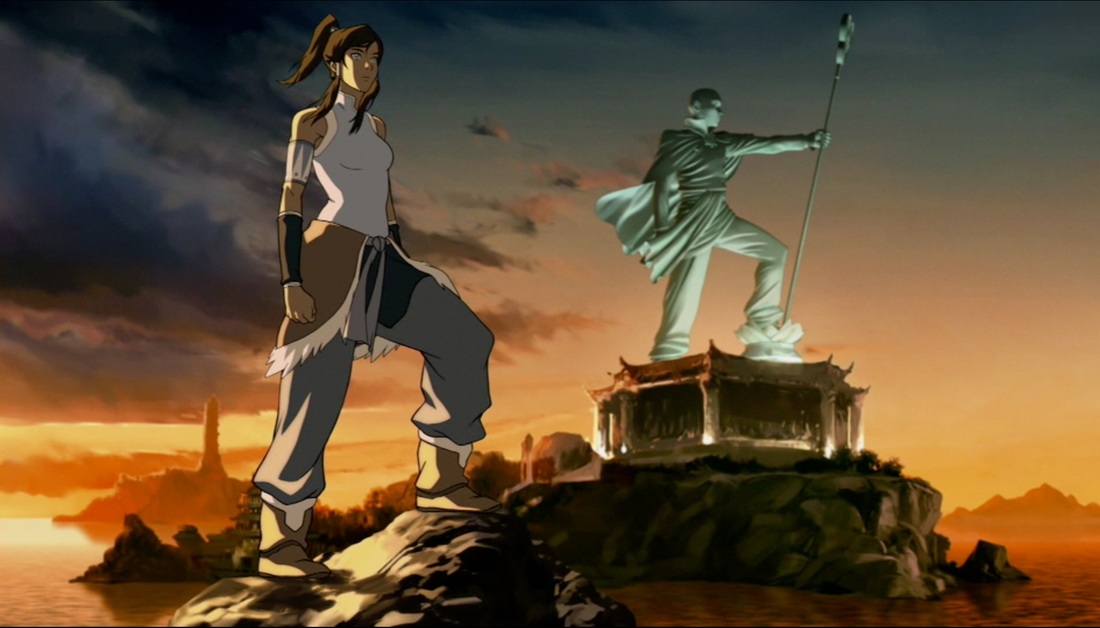Korra: But I feel like I’ve only just begun. There’s so much more I want to learn and do.
Genres: Adventure, Fantasy
Creators: Michael Dante DiMartino and Bryan Konietzko
Studios: Nickelodeon Animation Studio, Ginormous Madman, Studio Mir, Studio Pierrot
Length: 52 episodes (four seasons)
Years: 2012-2014
Highlights: The future of Western animation
The Legend of Korra is a sequel to Nickelodeon’s earlier series Avatar: The Last Airbender. Both series take place in a fantasy world based off East Asian and Native American cultures. Some of the people in this world have the power to “bend” (control) one of the four classical elements: Earth, Fire, Air, or Water. Only the Avatar, the bridge between the physical and spirit worlds who is continually reincarnated, can bend all four elements. The Last Airbender was a high fantasy series about the Avatar Aang, who is the “last airbender” since the rest of his people were killed in a genocide perpetrated by the Fire Nation. The series follows him and his friends in their quest to bring an end to a war that ravaged the world for 100 years, fought between the Fire Nation on one side and the Water Tribes and Earth Kingdom on the other. The latter group succeeded and brought balance back to the world. Time passed, and eventually Aang passed away. But the Avatar cycle continued.
Fast forward 70 years after the end of the war and we have the new Avatar, a young Water Tribe girl named Korra. She is reckless, impulsive, and hotheaded. She has already mastered waterbending, earthbending, and firebending. In order to begin her airbending training, she journeys from her home at the South Pole to the largest and most important city in the world: Republic City. But 70 years of social, political, and technological change have made the world very different than what Aang knew. Republic City is a modern metropolis complete with skyscrapers, automobiles, and the newly invented radios. Electricity lights the world and airships ply the skies. The world is enraptured with change, which Korra must guide. She must fulfill her duty as the Avatar and bring balance to the world.
The theme of Korra is change, and this manifests not only within the show but in its very nature. The Last Airbender, for all its uniqueness, was still a children’s show. As it turned out, it was massively popular outside its intended demographic, attracting almost as many teenagers and adults when the target demographics’ siblings and parents sat down to watch with them. The Legend of Korra was written from the start with this in mind. The Last Airbender is, at its core, an epic battle of good versus evil, and as such draws on the tradition of epic and heroic fantasy. Aang had to battle an evil, power-mad overlord bent on world domination; the character wouldn’t feel too out of place in a Tolkien or Rowling novel. Korra, on the other hand, is much more real; our hero struggles with communists, fascists, anarchists, and religious fundamentalists. And none of these antagonists are cartoony or goofy villains either; all of them are portrayed as complex, nuanced people with their own lives and personalities. All of them are sympathetic to a degree, and all of them make valid and important points about the state of the world even if their methods mean that they are opposed to Korra.
Over time, it became increasingly difficult for the show’s creators (Bryan Konietzko and Michael Dante DiMartino, often shortened to “Bryke”) to keep up the fiction that The Legend of Korra was meant for children; despite the show never showing any bloodshed, there are a number of onscreen deaths which leave absolutely nothing to the imagination. Furthermore, the show positively embraced adult subjects including terrorism, the clash of modernity and secularism with tradition and religion, political revolution, rape, mental illness and sexual identity. That’s right, in a kids show. Although this is quite typical anime (due to the Japaneses’ much more enlightened opinion of the subject of animated programming), this is completely revolutionary for American television, where most animation falls into the categories of either South Park or Frozen. It proved too much for its broadcasting network Nickelodeon; the first two seasons (Book One: Air and Book Two: Spirits) were broadcast on television, but the second half of season three (Book Three: Change) and the entirety of season four (Book Four: Balance) were distributed in digital format via the internet. Honestly, I’m surprised it took that long, as the show was quite up-front about its much more mature format.
All of that isn’t even getting into the technical aspects of the show. The writing and voice cast for the show are superb, leagues ahead of anything else on American TV. The action sequences are incredible, at least as good as the best anime I’ve seen. Benders in Korra’s world channel their powers through martial arts, creating a style of fighting blending the magical with the physical with such perfection as I’ve never seen anywhere else. And the actual animation and artwork is simply breathtaking. I mean, The Last Airbender looked good, but Korra looks absolutely amazing. If you don’t believe me, see for yourself.
The Legend of Korra has rightfully earned its place among my favorite anime series. I say this knowing full well that it is not an anime series, but it’s just impossible for me to lump this in with any of the other American animated shows I’ve seen because Korra is so far beyond them. It has completely revolutionized American animation by incorporating what makes anime so superior: well-written plot and characters and mature and sophisticated subject matter. We’ve turned a page and can never look back. The Legend of Korra is now the gold standard of Western animation and is the first American series able to go toe-to-toe with the best that Japan can throw at us; it shows that we can make cartoons just as good as the best anime. It’s The Legend of Korra, and it’s complicated, it’s beautiful, and it’s just all-around awesome. Just go watch it, you’ll thank me later.



 RSS Feed
RSS Feed
